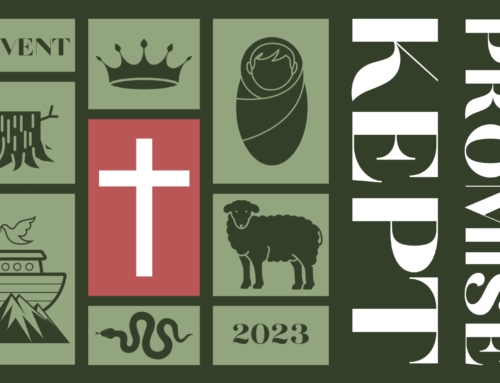The Five Points of the Gospel
By Pastor Josh Wamble
If someone asked you what they had to do to get saved, could you answer? What if someone asked you why Jesus became a human or why He had to die—couldn’t God save humanity some other way? What if someone asked you to explain the gospel?
“Gospel” is one of those words that gets used a lot in Christian and church contexts, but sometimes there is confusion surrounding just exactly what it is that we are talking about. There’s a genre of music called “gospel.” There are four gospels in the New Testament (Matthew, Mark, Luke, and John). But, when Christians talk about the gospel, they are usually referring to the message of salvation. The word evangelism comes from the Greek word that means gospel or good news.
So what is the gospel—the good news—the message of salvation? What must we include in order to be faithful to the full message given in the Bible? What must someone believe in order to be saved? There are different ways of summarizing the gospel. Some use four points or headings. Some use six points or headings. Some use different acronyms like G.R.A.C.E. or F.A.I.T.H. Below, I will summarize the gospel in five points—one for each finger of your hand.
The Gospel Summarized in Five Points
1. God is Holy.
God is holy. He is completely set apart from his creation. He is morally pure and always does what is right. He is good and true and just and impartial. He is rightly focused on Himself and His own glory.
2. We are not Holy.
When Adam sinned in the Garden of Eden, he did so as our representative standing in for all of humanity. Therefore, all humans are born with a sinful corrupted nature and guilty before God. We are not holy. We are not morally pure, and we often do what is wrong. We are not always good. We often are not truthful. We do not always treat others justly and often show partiality toward ourselves or others that we are connected to. We are not rightly focused on God and His glory. We often focus on ourselves and our own glory above God’s. Sometimes, we value parts of creation above God. We have rebelled against the God who created us, loves us, and provides for us!
3. This is a Problem.
Our guilt and sinfulness create a division between us and God. How can God remain holy and reconcile Himself to us? If God always does what is right, then he must do what is right toward guilty sinners. How can God forgive sinners without becoming unjust and unrighteous? Forgiving guilty sinners would require God to show partiality and no longer be true. He would no longer be good. (Think of a judge who lets people go free even though they are clearly proven to be guilty beyond a doubt.) If God is to remain holy, he must pronounce a true and right judgement against sinners. This is a big problem.
4. Jesus is the Answer to this Problem.
God could have left us in this position of guilt and rebellion against Him, but He chose not to. God has provided an answer by taking on humanity in the person of Jesus. Since Jesus is fully man and fully God, He can serve as a mediator between God and us. We can be reconciled to God in the person of Jesus! Jesus is fully human, but since he is not descended from Adam, He was not born with a sinful and corrupted nature or guilty before God. Since Jesus never sinned and lived a perfectly holy life (good, just, right, true, morally pure, impartial, and rightly focused on God and His glory), He is not guilty of sin. This means that Jesus can serve as a perfect sacrifice—a substitute for guilty/sinful humanity. Jesus takes our guilt and suffers our punishment before God. In addition, we are credited with His holiness and righteousness since He lived a perfect/holy life as our representative! This means that God can forgive sinners and remain holy. He doesn’t simply overlook our guilt and sin. He does what is right by justly and impartially judging our sin in Jesus. Since Jesus is fully God, he is able to fully consume God’s wrath toward our sin so that justice is fully done.
5. How Will You Respond?
Salvation is not an automatic thing. God requires us to make a choice. Will we continue in our rebellion and sin following the course of Adam or will we surrender and swear allegiance to Christ as our new representative? We must turn from our love of sin, abandon our own attempts to reconcile ourselves to God, and trust in the only solution that God has provided in Christ.
Sharing the Gospel with Other People
Remembering these five headings (1. God is holy. 2. We are not holy. 3. This is a problem. 4. Jesus is the answer. 5. How will you respond?) can make sharing the gospel with people much less intimidating. You don’t have to remember everything the Bible says or know how to answer every question someone might have. Remembering just these five points will give you confidence to talk to people about God’s plan of salvation.
Speaking with people about the gospel also requires wisdom and some discernment. Once you get a good understanding of the person you are talking with, you will not always have to go into great detail about all five of these points.
The person you are talking with may know and feel greatly that they are sinful, but may not believe that God is holy. He may think that a good God would not allow some specific thing that has happened to him. In this case, you would need to spend more time on the first point showing that God really is holy and all that that means.
Another person that you talk to may believe that God is holy but think that she is a pretty good person. In this case, you could almost skip over the first point and focus more on the second point and how serious her sin and guilt before God is.
A person who believes that God is holy and that we are sinful but thinks God should just forgive everyone, would need to be confronted with the third point and why this is such a big problem—how a holy God cannot just overlook sin and guilt and remain holy.
A person who agrees with the first three points may think that his sin is so great and the problem is so big that God cannot forgive his sin. In this case, you would need to spend time explaining the fourth point—how Jesus is the answer to this problem and has made a way to reconcile us to God, provide forgiveness for our sin, and remain holy.
Finally, if the person you are talking to understands the problem and how Jesus answers it but thinks that means that God will automatically forgive everyone, you will need to explain how in her sin she is still following Adam in rebellion against God. You will need to help her see that she needs to turn from her rebellion and sin and swear allegiance to Christ as her new representative before God and trust Him to reconcile her to God.
In all of these scenarios, we need to remember that the Holy Spirit is the one who converts and rely on Him to do so. We should never try to convince someone or convert someone under our own power or ability or cleverness. We should always join prayer with our explanations of the gospel asking God to give us the words and wisdom to explain the gospel well and asking Him to convict our friend of sin and open his heart to believe!
As people who have been changed by the gospel, we should always be seeking opportunities to share that same message of salvation with those around us—our family and friends and coworkers and neighbors and even strangers when we have opportunity. We should look for opportune times and pray that God would provide those.
I hope that this five point summary of the gospel is a help to you in your sharing the gospel. I hope that it will give you more confidence to do so. I pray that God will use this tool to make us more evangelistic people and a more evangelistic church!




